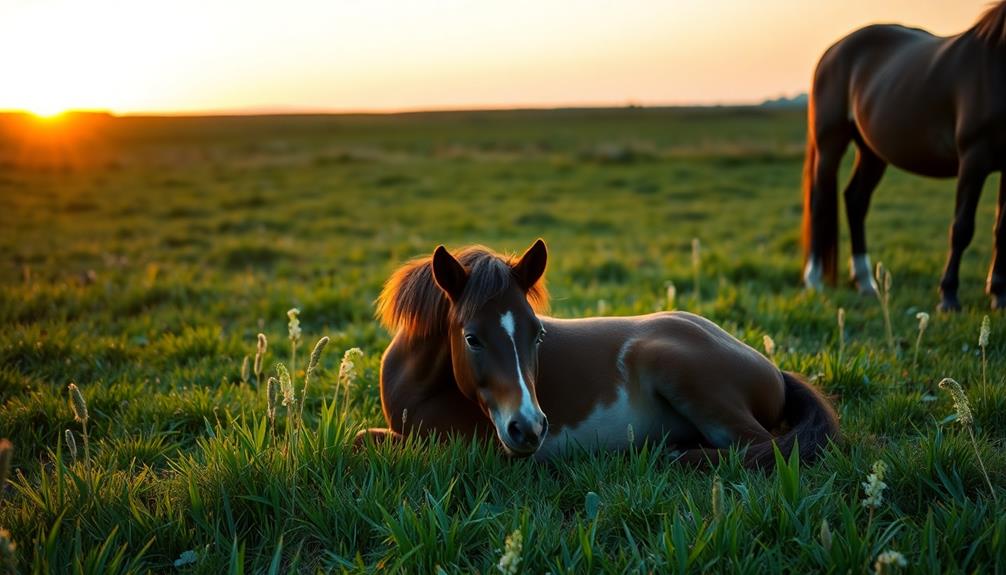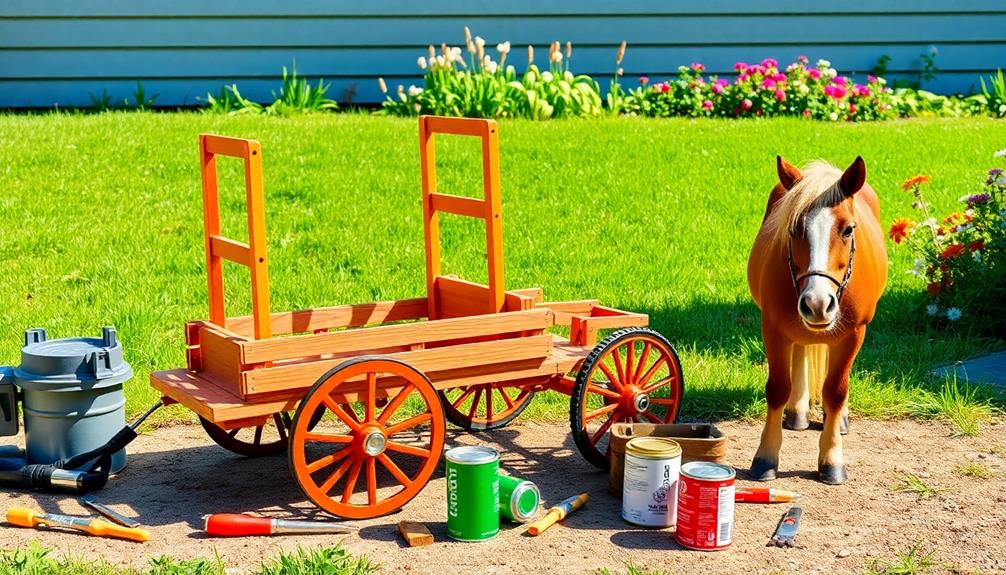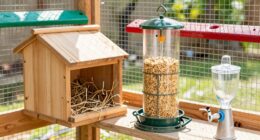Miniature horses are charming, energetic creatures that stand under 34 inches tall and have lively personalities. To keep them healthy, you’ll need to follow a regular grooming routine, including brushing their coat, checking their hooves, and inspecting their skin for issues. Different breeds require specific care for their unique coats and grooming needs. Paying attention to their comfort and building trust enhances their well-being—stay with us to discover more about caring for these tiny, mighty horses.
Key Takeaways
- Miniature horses are small, typically under 34 inches tall, with big personalities and charm.
- Regular grooming, including brushing and hoof care, is essential for their health and appearance.
- Different breeds have unique coat types requiring specific grooming tools and routines.
- Routine hoof trimming and skin checks help prevent common health issues.
- Proper care, patience, and gentle handling strengthen bonds and ensure their well-being.

Miniature horses are small but mighty creatures that have captured the hearts of many enthusiasts. These tiny horses, often less than 34 inches tall at the shoulder, may be small in size, but they have big personalities and plenty of charm. If you’re considering bringing one into your life, understanding their unique needs is essential, especially when it comes to horse grooming. Unlike full-sized horses, miniature horses require specific care routines that accommodate their size and delicate build. Regular grooming isn’t just about keeping them looking good; it’s also a crucial part of their health routine. You’ll want to create a grooming schedule that includes brushing their coat to remove dirt and loose hair, inspecting their hooves for debris, and checking their skin for signs of irritation or parasites. Since miniature horse breeds come in a variety of types, each with different coat textures and grooming needs, it’s important to learn about your specific breed to tailor your care routine. Some miniature breeds have fine, silky coats that need gentle brushing, while others have thicker coats that require more frequent grooming, especially in shedding season.
When grooming your miniature horse, use soft brushes and gentle strokes to avoid causing stress or discomfort. Pay close attention to their hooves, as miniature breeds can be prone to issues like thrush or overgrown hooves if not regularly trimmed. You might find that a farrier with experience in miniature horses makes a big difference in maintaining healthy hooves. Additionally, miniature horses often have more sensitive skin, so choosing mild shampoos and conditioners can help prevent skin irritations. Proper grooming also gives you a chance to check for any cuts, swellings, or abnormalities that may need veterinary attention. The more familiar you become with your miniature horse’s coat and body, the easier it will be to spot problems early. Regular grooming routines can also strengthen the bond between you and your miniature horse, making handling easier and more enjoyable.
Furthermore, understanding the variety of miniature horse breeds can also influence your grooming routine, as different breeds may have specific grooming requirements. For example, some breeds are known for their beautiful, flowing manes and tails, which require regular detangling and trimming. Others have more compact coats that don’t shed as heavily, simplifying grooming routines. Breeds with unique coat textures may also benefit from specific grooming tools or products, inspired by herbalism principles that support skin and coat health. No matter the breed, establishing a consistent grooming habit will help you build trust with your miniature horse and keep them healthy and happy. Ultimately, caring for these tiny equines involves more than just admiration; it demands attention to detail, patience, and a gentle touch. Proper horse grooming and knowledge of miniature horse breeds will ensure your small companion remains lively, healthy, and a joy to be around.
Frequently Asked Questions
How Long Do Miniature Horses Typically Live?
Miniature horses typically live 25 to 35 years, so you can enjoy their company for a long time. Their durability and lifespan make them wonderful long-term companions. Proper care, a healthy diet, and regular veterinary visits help guarantee your miniature horse stays happy and healthy. With proper attention, you might even see your tiny equine thrive into their late teens or early thirties, making the investment well worth it.
Are Miniature Horses Suitable for Children as Pets?
You might wonder if miniature horses are suitable for children as pets, but it depends on child safety and the horse’s temperament. These gentle animals can be great companions for older kids if properly trained, supervised, and socialized. Always consider their size and strength, ensuring the horse’s behavior is calm and predictable. With proper care and safety measures, miniature horses can become wonderful, loyal pets for your family.
What Are the Common Health Issues in Miniature Horses?
You might think miniature horses are low-maintenance, but beware—hidden health issues could surprise you. Genetic disorders often lurk beneath their tiny frames, causing unexpected problems. Dental issues are common, too, and can lead to discomfort if ignored. Staying vigilant and scheduling regular vet visits helps catch these concerns early, ensuring your miniature horse stays happy and healthy. Don’t overlook these risks—they could make all the difference in your tiny companion’s well-being.
Can Miniature Horses Be Trained for Riding?
You can train miniature horses for riding, but they’re best suited for specific activities like horse jumping and trail riding. Their small size makes them ideal for beginners or children, and with proper training, they can become confident and safe riders. Keep in mind, they require gentle guidance and consistent practice. While they excel at certain tasks, don’t expect them to handle long-distance trail rides or complex jumps like full-sized horses.
What Is the Cost Range for Adopting a Miniature Horse?
You’re asking about the cost of adopting a miniature horse, and it’s a bit of a mixed bag. The adoption process varies, but typically, you’ll pay anywhere from $500 to $3,000. Keep in mind, miniature horse breeders might charge higher for show-quality animals. Remember, adopting isn’t just about the price—it’s about finding a healthy, well-cared-for companion who’ll be with you for years to come.
Conclusion
Now that you know the essentials about miniature horses, you’re ready to welcome one into your life. These tiny equines are not just adorable—they’re full of personality and charm that can brighten even the gloomiest days. With proper care, you’ll discover they’re like living, breathing pocket-sized miracles. So go ahead, embrace the joy of miniature horses—they might just be the most incredible little creatures you’ll ever meet!










